- Home
- Pam Jenoff
The Diplomat's Wife Page 12
The Diplomat's Wife Read online
Page 12
A waiter approaches the table with a pot of tea and plate of scones. As he pours the tea, I study Simon, still wondering if it was proper for me to accept the invitation of a man I do not know, especially now that I am engaged. He is just being friendly, I decide.
“So what brings you to England?” Simon asks after the waiter has left again.
I take a deep breath. “A friend of mine passed away.” I still cannot see Rose’s face in my mind without my eyes burning. “I’m bringing the news and her belongings to her aunt in London.”
“I’m sorry to hear that.”
I nod. Talking about Rose with this stranger feels awkward. “And you?” I ask, eager to change the subject.
“I’m British,” he replies, taking a croissant from the plate of pastries that sits between us.
“I guessed that. I meant, what were you doing in Europe?”
“I’ve been in Europe for several months now for work. I’m a diplomat, you see.” Simon’s English is different from any I have heard before, clipped and precise, not difficult to understand. “I was helping to restore our embassies in the various cities where they were shut down during the war.” He works for the government. I worry again that I should have introduced myself as Rose, in case he sees my papers.
“Now I’m headed back to the Foreign Office. I’ll be going back to the department where I was working before this trip, Eastern European affairs.” He gestures to the plate of croissants. “You should try these, by the way. They’re delicious.”
I choose one of the croissants. “I’m from Poland,” I offer, before taking a bite. The pastry is light and flaky, with delicious bits of chocolate inside. It is not as good, I decide, as the one I had in Paris. I remember the patisserie, my surprise at seeing Paul. Why could it not be him sitting here with me now, instead of this man?
“Really? I thought from your accent that might be the case, but I didn’t want to ask. You know, if you’re looking for work once we reach London, I could use a secretary, one who speaks Polish….”
“Oh, goodness no,” I blurt out, my mouth still full. I finish chewing, swallow. “I mean, that’s very kind of you, but I’ll only be in London for a few weeks.”
“I see.” His brow furrows momentarily. “And then what?”
I hesitate. “I’m meeting up with my fiancé and traveling to America to live. He’s a soldier and he’s coming for me as soon as he’s discharged.”
A strange look crosses Simon’s face. He looks down at my hand. “I didn’t see a ring.”
“It was very last minute,” I explain. “The engagement, that is. We didn’t really have time to formalize things before I left for England.”
“Of course.” His voice is strained. Were his intentions romantic when he invited me to tea? I study his face, wondering if I had given him the wrong impression. He is not unattractive, with his smooth, even features and blue eyes. But when I think of Paul’s rugged good looks, the way he takes my breath away, there is no comparison. “Congratulations,” he adds, without feeling.
“Thank you.”
He clears his throat. “It’s too bad.” My eyes widen. Could he possibly be that blunt? “I mean, I could really use your help at the Foreign Office,” he adds quickly.
“My help? I’m sorry, I don’t understand.”
“The situation in Poland, throughout Eastern Europe right now, demands urgent attention.”
“What do you mean?” I clutch my napkin in my lap. I heard little news during my time in Salzburg and none in Paris other than that the war had ended. “What’s happening?”
Simon wipes a crumb from his mouth. “As you probably know, the Soviets liberated much of Eastern Europe.” I nod. I had learned this much from some of the other Polish refugees at the camp. Simon continues, “The problem is now that the war is over, all indications are that the Soviets won’t keep their word on restoring the sovereign leaders of those countries. Take Poland, for example.” His voice rises slightly, his expression growing more intense. “The Soviets have certain eastern territories like Lwow outright and they’ve recognized the temporary government in Lublin, which is nothing but a puppet regime. It’s the same all over Eastern Europe.”
Anxiety rises in me. The notion of Russian tanks rolling through Kraków is only slightly less terrifying than the Nazi occupation. “Why doesn’t the West do something?”
“We’re trying. During the war, no one wanted to upset the Soviets because we needed them to fight Hitler on the eastern front. Now that’s all over, but the Soviets have gained a toehold in virtually every country in Eastern Europe, either directly or through satellite communist parties.” I listen carefully, not understanding some of the English words he uses, but comprehending what he is trying to say.
“And because their troops occupy the region, there’s little we can do about it. And it’s not just in the east—even in places like Germany, the communists have strong political support. You’re not a communist supporter, are you?” I shake my head. There had certainly been those among the resistance movement who leaned to the left, believing that socialist ideals were the answer. Jacob had believed in socialist principles but said that he could not support the way in which the Soviets had corrupted them. I had listened to the debate, not forming a view of my own. Simon continues, his voice rising slightly, “The battle with the communists is coming, Marta. It will be the next great war, maybe even bigger than the last.” There is a sudden intensity to his pale blue eyes.
My head swims. “I had no idea.”
The ship begins to rock more forcefully. I reach out to steady my teacup. “We must be getting closer to the coast,” Simon observes, peering out the window.
I follow his gaze to a thin strip of land that has appeared on the horizon. “I should go freshen up for our arrival.” I push back my chair from the table. “Thank you very much for the tea.”
“My pleasure,” he replies, standing as I do. “Would you like a ride to London once we arrive? My driver will be waiting for me. It’s really no trouble.”
For a second, I consider his offer. It would be so easy simply to let him take me to the city. But there is something about his attention, about the way he is looking at me that makes me uncomfortable. And I really do not know him well enough to accept. “No, thank you. I’m being met at the station,” I fib. “But I appreciate your kind offer.”
A look of disappointment crosses Simon’s face. He reaches into his pocket and pulls out a small silver case. “My card,” he says, handing me a square of paper. “In case your plans change.”
“They won’t,” I reply, hearing the firmness in my own voice.
“Well, then, in case you need anything when you are in London.” His fingers brush mine as I take the card.
I am suddenly seized with the urge to flee. “Th-thank you again.” I tuck the card in my bag, then turn, feeling his eyes still upon me as I walk quickly away.
The coal-tinged air is cool and damp as I make my way across the tree-lined square toward the row of houses that sit on its far edge. It is dark now, the dim yellow light given off by the street lamps swallowed almost immediately by the thick London fog. The faded street sign at the far edge of the square reads Montpelier Place. The houses rise high behind tall iron gates, thick hedges obscuring their porches from view. Number 33, the address written on my visa, sits on the nearest corner, overlooking the square. I cross the street and stop in front of the massive house. Rose was so quiet and unassuming, I had never imagined her family to be rich. My legs tremble.
Steeling myself, I walk up to the gate and peer through its bars. On the other side, well-tended gardens flank wide marble stairs leading up to a columned porch. I look at the windows, all of which are dark. It is not proper to be calling this late. But when my train pulled in to Victoria Station, I did not know what else to do. Except for my brief meeting with Simon Gold, I know no one in London and I have no money for a hotel. So I found my way here, following the directions a woman on the train
had given me, taking the Tube to Sloane Street and then walking the last several blocks. Looking now at the grand house, I feel this was a mistake. Then my hand drops to my bag and an image of Rose’s face appears in my mind. I have to do this for her.
I take a deep breath, then press the doorbell. A ringing sound comes faintly from inside the house. There is no response. My heart pounds. Perhaps Rose’s aunt is away on holiday somewhere. I press the bell again.
“Yes?” a man’s voice says loudly. I jump, then look through the gate, but the door is still closed. “What is it?” I notice that the voice comes from a small black box with holes in it, just above the doorbell.
I clear my throat. “I—I’m looking for Delia, I mean, Mrs. LeMay.”
“This is the LeMay residence,” the voice replies stiffly. “However, Mrs. LeMay is not expecting any visitors tonight.”
“But…” I begin.
The voice interrupts. “It’s late, miss. Come back tomorrow. Or better yet, call first.” There is a clicking sound and the box goes silent.
I start to turn away, feeling my cheeks redden. Then I stop. I have to do this. I ring the bell once more. “What is it?” the man snaps. “I just told you…”
This time I speak before he can finish. “Please. It’s extremely important. If you could just come to the door…”
There is no response. I stare at the box. Had he hung up on me again? I look down the street. I will find somewhere to sleep, I decide, then come back tomorrow. As I turn to go, there is a clicking noise on the other side of the gate. I look behind me to see a thin, vertical shaft of light coming from the porch. “What do you want?” This time, the man’s voice comes from the door.
“If you could just open the gate…” The man does not respond but shuffles forward down the steps with great effort. As he emerges from the shadows, I can see that he is bald except for a fine ring of silver hair. He wears a dark pressed suit and ascot that seem formal, given the late hour. I try to recall if Rose ever mentioned an uncle.
The man reaches the gate but does not open it. “Yes?” I feel myself shrink under his sweeping glance.
I take a deep breath, choosing my English words with care. “I—I’m here to see Mrs. LeMay.” I raise my hand. “I know it’s late. I should have called first. I’m sorry. But I’ve traveled a great distance and I must speak with her. It’s about her niece, Rose.”
A look of recognition flashes across his face. “Rose?” he repeats. “What is it?”
I hesitate. Part of me wants to give the news and Rose’s belongings to this man and be done with it. “Are you family?”
“No, I’m the butler, Charles,” he replies. “But I will pass your message on to Mrs. LeMay.”
I shake my head. “I’m sorry, but I must speak with Mrs. LeMay directly.”
The man studies my face for several seconds, not speaking. Then he opens the gate. “Come in, and we’ll see if Mrs. LeMay will receive you.”
As I follow him up the porch steps, the thick perfume of honeysuckle rushes up to greet me. Suddenly I see Rose, playing in the garden as a child. Sadness wells up in me. She should be here now, too.
Forcing down my sorrow, I follow the butler through the door. Inside, there is a large foyer, its floor checkered with black-and-white square tiles. Straight ahead, a staircase leads up into darkness. “Wait here,” Charles instructs firmly before disappearing through the doorway to the left. I stand in the middle of the foyer uneasily. Through a doorway to the right, a clock ticks, breaking the silence.
A moment later, I hear footsteps above me. A light goes on at the top of the stairs and an elderly woman appears. “Good evening,” she says as she descends the staircase. “I’m Delia LeMay.” Rose’s aunt looks nothing like I expected. Barely reaching my shoulder, she seems nearly as wide as she is tall. Her round face, dominated by full cheeks, is topped with an enormous shock of white hair that has been corralled into a bun that seems ready to burst from its trappings at any second. But her violet eyes are unmistakably Rose’s. She eyes me warily. “Charles tells me you are here about my niece.”
“Yes. My name is Marta Nedermann. I—”
“Marta!” Delia exclaims. Her face breaks into a wide smile, lifting her cheeks until they threaten to eclipse her eyes. “I had no idea it was you.” She waddles across the foyer more quickly than her girth would seem to permit, then reaches up and kisses me on both cheeks, her flowery perfume tickling my nose. “Rose wrote me all about you. I sent in the paperwork to extend her visa, and get you one, too.” So Dava was right. Rose had wanted me to come to England with her. “But I wasn’t expecting you girls for a few months yet. What are you doing here?”
I hesitate. “Do you suppose we could sit down?”
“Of course, how rude of me! You must be exhausted from your trip.” She ushers me through the door on the right into a parlor. The furniture, a couch and two chairs, is covered in matching pink-flowered silk slipcovers. Framed photographs cover the coffee table, windowsill and mantel. “Charles,” Delia calls loudly. The butler appears once more. “Two cups of tea, quickly, please.”
“Yes, ma’am.”
After he leaves, Delia gestures to the sofa. I hesitate, not wanting to dirty the fine fabric. “Come sit,” she urges. “I’m sorry if Charles was rude. We’ve had so many people coming to the gate these recent months, beggars mostly. It’s a shame what this war has done to people’s lives. We try to help when we can, of course, but there have been some unsavory types, too. Hooligans who would just as soon cause trouble. We have to be careful.” As she sits down at one end of the sofa, a large gray cat appears and leaps into her lap. “This is Ruff,” she says, scratching behind the cat’s ears. “He’s nearly fifteen years old. Rosie named him. I tried telling her that the name was better suited to a dog, but she was quite a stubborn child.”
I try to imagine quiet, gentle Rose as stubborn. The war must have changed her so. Then I notice a painting above the mantel of a young girl with a delicate face and strawberry-blond hair. “Is that Rose?”
Delia smiles. “Yes. In the summers when Rose didn’t come here, we would meet at the family villa on the coast near Trieste. We had a local artist paint her portrait when she was nine. It’s always been my favorite.” Watching her eyes dance as she studies the painting, dread rises in me.
Charles reappears with the tea and pours two cups for us before leaving again. Delia hands one of the cups to me. “No sugar, I’m afraid. We’re all out of ration cards until next week and there doesn’t seem to be any to be had on the market.” She means the black market, I realize with surprise. It was hard to imagine a woman such as Delia procuring things illicitly, but her tone is matter-of-fact, as if doing so is a routine part of life since the war. “So how is my dear Rose? And what brings you here?” She stirs her tea. “I mean, Rose wrote that you were going to be coming with her. Is she not well enough to travel yet?”
I take a sip of tea, forcing myself to swallow over the lump that has formed in my throat. “Mrs. LeMay, you know that Rose was terribly ill.”
A grave look crosses her face. “Yes. She’s suffered from her blood affliction for many years. But she wrote me from Salzburg that she was getting much better, stronger every day. Thanks to you and a nurse, Dana or something.”
“Dava. She was very good to both of us.” I pause. “Rose was getting better.”
“Was?” Delia speaks slowly, a look of realization crossing her face.
“You don’t mean…?”
“I’m afraid so.”
Her face pales. “What happened?”
“She developed a terrible fever a few days ago. The doctors and nurses did everything they could for her, but the fever was too much, given her weakened state. I’m so sorry.” Delia stares straight ahead, not speaking. I reach out, take the teacup from her shaking hands and set it down. “Perhaps I should call Charles?” She does not answer but buries her face in her hands, sending the cat flying from her lap. Her back shakes as sh
e sobs silently.
A few moments later, she looks up again. “I begged her to come here and live with me before the war. But her father was too sick to travel and she wouldn’t leave him. She said Amsterdam was their home, that everything would be fine.” We all thought that, before the war, I want to say. “I just can’t believe that she’s gone,” she sniffles. “She was like my own child.”
“I know.” I reach out and touch her hand. “She talked about you all the time. She was so excited about coming here and starting a life with you.”
“She was the only family I had left.” Delia wipes her eyes.
“Was…was she happy? At the end, I mean?”
“Very. She was in a beautiful place, with good care and friends.” I describe for her the palace and the grounds. Then I reach into my bag and pull out Rose’s belongings. “Here.” I show her a picture Rose had drawn of the view from the terrace of the mountains and the lake at sunset.
“It’s beautiful.” She reaches into the small pile of Rose’s belongings and pulls out a letter. “This is from me.”
“I know. She kept all of your letters. She loved you very much.”
She does not speak for several minutes. “And you came all the way here to give me these?”
“Yes. Dava suggested that I come. But I didn’t have a visa of my own so I used Rose’s. I hope you don’t mind.”
“Of course.” Delia wipes her eyes, managing a smile. “That was very kind of you. But what will you do now? Are you planning to go back to the continent, or will you stay in England?”
I hesitate. It feels strange to speak about my plans for the future so soon after informing her of Rose’s death. “Neither, actually,” I say at last. Quickly, I tell her about Paul.
“An American soldier!” Her eyes brighten slightly. “That’s terribly romantic.”
“He’s coming to meet me in London in just under two weeks,” I add. “Then we’ll travel to America together.”

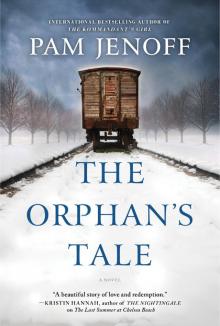 The Orphan's Tale
The Orphan's Tale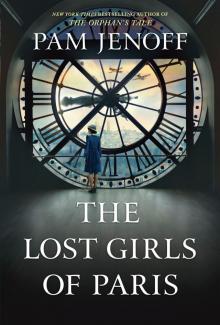 The Lost Girls of Paris
The Lost Girls of Paris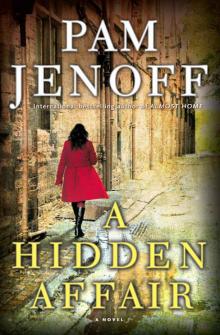 A Hidden Affair: A Novel
A Hidden Affair: A Novel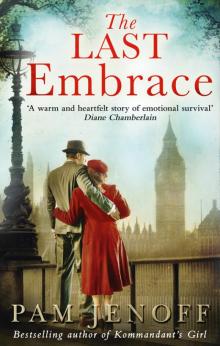 The Last Embrace
The Last Embrace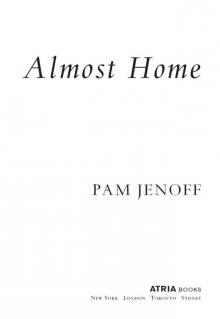 Almost Home: A Novel
Almost Home: A Novel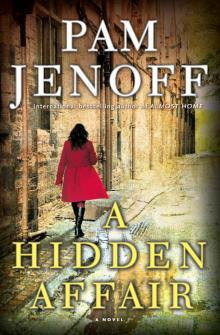 A Hidden Affair
A Hidden Affair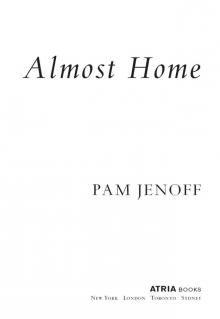 Almost Home
Almost Home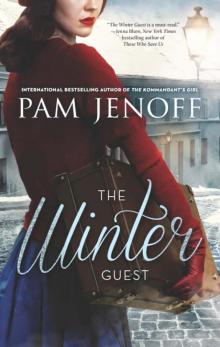 The Winter Guest
The Winter Guest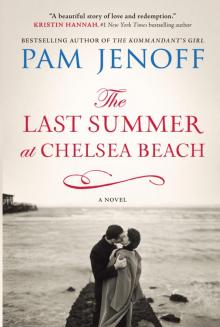 The Last Summer at Chelsea Beach
The Last Summer at Chelsea Beach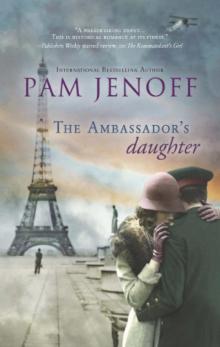 The Ambassador's Daughter
The Ambassador's Daughter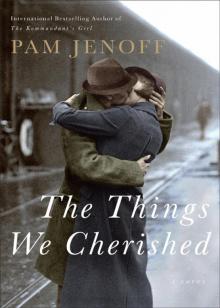 The Things We Cherished
The Things We Cherished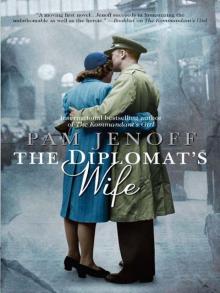 The Diplomat's Wife
The Diplomat's Wife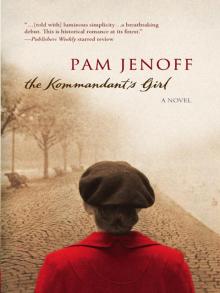 The Kommandant's Girl
The Kommandant's Girl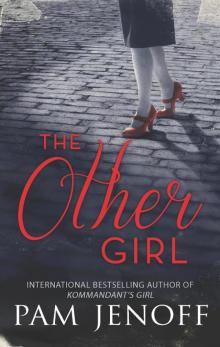 The Other Girl
The Other Girl